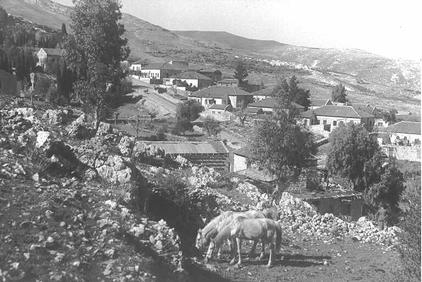
24 July 1882 – 8 Av 5642
Moshe David Shuv, representative of the Rumanian branch of the Lovers of Zion (Hovevei Zion) movement, completed a land purchase that would become the basis for the settlement of Rosh Pina, which vies with Rishon Lezion for the honor of being the first Jewish agricultural settlement in Israel.
Eliezer Rokach and some colleagues from the country’s original ultra-Orthodox community had already bought half the land owned by the Arab village of al-Ja’una, just below Safed near the road leading to Tiberias. In 1878, a group of 17 Jewish families moved out of Safed and settled there, calling their new village Gei Oni (valley of my strength), in a Hebrew version of the Arabic name. After a few years struggling with drought, most of them had moved back to Safed, leaving only three families behind. After the Focșani Congress of 1882, the first convened by the Lovers of Zion, thirty more families, all hasidic Jews from Moinești in Romania, decided to emigrate to the Galilee and try their hand at agriculture. They sent David Shuv (whose name was an acronym of shohet u-bodek, a ritual slaughterer, though it also meant “return”) to look for a suitable place. He negotiated to buy land from Gei Oni as well as from neighboring al-Ja’una, and completed the purchase on behalf of the group, who described themselves as “a society for the settlement of the Land of Israel through agriculture,” on July 24, 8 Av 1882.
On December 30 1883 (1 Tevet) the first settlers arrived, holding out despite economic difficulties and the Ottoman authorities’ persecution. Shuv had already decided that the village’s name should be changed from Gei Oni to Rosh Pina, as the verse from Psalms (118, vs. 22) “The stone rejected by the builders has become a corner-stone,” fit it like a glove.
The first Jewish village in the Galilee was an important milestone in realizing the Zionist dream, and the story of Rosh Pina has been the basis of songs, novels and films. Valley of Strength (Gei Oni) by Shulamit Lapid is one of the most famous:
In the end there were only six families left that hadn’t changed their minds about going back to Moinesti. Fania peeked at them and couldn’t tell which she’d regret more; those who’d decided to stay, or those who’d decided to abandon the Land. Suddenly there was a kind of gaiety in the air. On the spot, they announced the founding of Rosh Pina, and Reb Mottel Katz, Reb Moshe David’s brother-in-law, pronounced the blessing for new possessions. Riva whispered “Amen” and sucked in her breath. Her eyes sparkled with hope, but she’d seen too much to let that hope overwhelm her. She was the real heroine of this occasion, thought Fania to herself, and in a sudden impulse, kissed her friend’s cheek. (Trans. Philip Simpson, Toby Press, 2009)
Also highly recommended is Sam Finkel’s compendium of this period, Rebels in the Holy Land, 2012, distributed by Feldheim.
